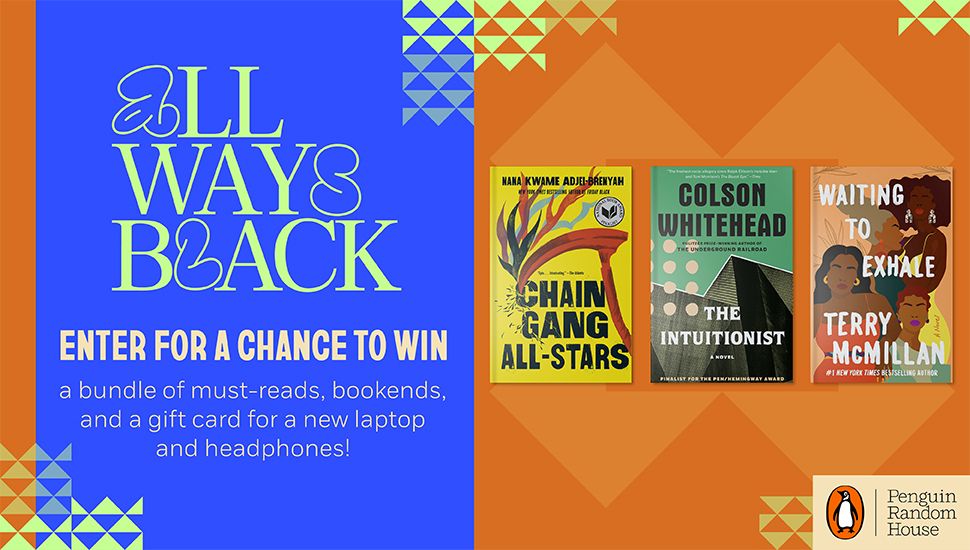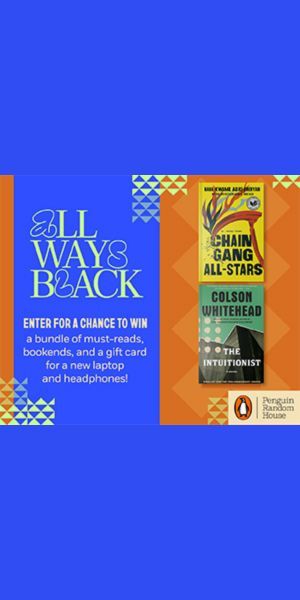
Do Gamers Read? The Pros and (Joy-)Cons of Gaming Life in Books
I am a gamer, and I read books. Yet the one thing that will turn me off any book is when the creator falls back on the same old nerdy gamer stereotype. It’s almost like they forgot to ask the question, “Do Gamers Read?” I mean, have you heard about The Witcher? Or perhaps American McGee’s Alice? There’s even a whole genre of video games designed for people who like to read: Narrative Games. And while it is easy to imagine gamers who like to read, it has only been very recently we have seen any respect for readers who may happen to like gaming too.
Don’t get me wrong: movies and television haven’t exactly nailed the depiction either. Very rarely do we see gamers represented in books (or any media) without society snubbing us as awkward. This is even despite video games scoring some social bonus points during the COVID Lockdowns. I mean, how were they to know video games in an online environment could potentially bring people together AND help us with minor health management issues? </sarcasm>
The good news is we have more books available today with broader (and, honestly, more accurate) depictions of the gaming community. The downside: in a world where Gamergate is still an issue, along with even bigger concerns for racism and ableism in games, misrepresentation of gamers just keeps feeding its own hideous mini-bosses. This is not limited to gaming; we’ve seen the exact same issue appearing with comics and science fiction writing for many years. And in the same way I really hoped the MCU would aid the comic book industry, I was also hoping the recent surge in video game love would finally lift gamers out of the social gutters and at least onto the footpath.
The pros and cons of gaming life in books depend purely on the depiction of gamers. Is this the real life? Or is it Final Fantasy? In the grand scheme of representation in books, asking “Do Gamers Read?” is probably down the end of the priority list. However, for an industry worth a collective US$190 billion, I’m surprised there aren’t more books featuring gamers. I mean, surely there is a market for this amazing Venn diagram? (**pssst! I’m right here!! Willing to read any book that shows me as a normal gamer!!**)
So here are some pros and cons to the way gamers and gaming are portrayed in books, plus books that get the depiction right.
Pros: Gamers are More Than One Gender
In news that surprises absolutely no one: women account for 48 percent of gamers in the USA. That’s based on a binary question, without any consideration for those who identify as a gender other than male or female. Even in the 1980s, the ‘gender divide’ in gaming was still moderately balanced. My mum bought our first computer, a Commodore 64. Not Dad. Mum. I programmed my first video game on that monster in BASIC. We also had an ATARI 2600 and held many neighbourhood tournaments. Yet, SOMEHOW, the majority of books featuring gamers have males as the central characters. And to make it worse, the majority of female representation in gamer books tends to be in romance novels. That’s great for addressing the myth about gamers and relationships, but we’ll come to that shortly.
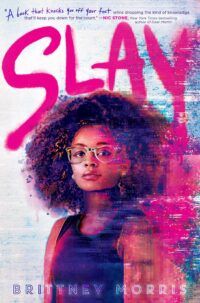
Slay by Brittney Morris
Here’s how you level up gender diversity. Kiera Johnson is a college student who also happens to be the developer behind SLAY, a secret online RP-card game. She created the game as a safe space for Black gamers to duel worldwide. Then someone dies. It’s easy for the media to turn against the online game community. It’s much harder for Kiera to save her creation and the community she strives to protect. This book is so clearly written by a gamer; Morris shows such care for her characters and ensures they are all grounded in reality. Not surprising, when she comes from a game-writing background herself.
Cons: Gamers are Socially Awkward Introverts
The people who think all gamers are male are usually the same ones who think all gamers are hiding away in the bedrooms, avoiding all social interaction. Clearly, they have never been to PAX (or any other major gaming convention). Or perhaps they never played Pokémon Go, with massive groups of people meeting up on ‘Community Days’ and sharing in the battle woes. Fortunately, the narrow views on this one are shifting, and we are seeing more books embracing the diversity of personality amongst gamers — as well as a diversity in social venues to meet up.
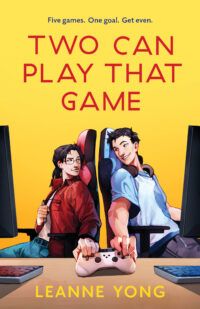
Two Can Play That Game by Leanne Yong
Truthfully, there are so many characters to love in this book. Sam Khoo is leveling up from High School to University, with a scholarship for computer programming and everything. But it’s not what she really wants: to create cool indie games. She sees her dream career balancing on a ticket to a game-design workshop — and the last one was stolen by Jaysen Chua. To win it back, Sam proposes a 1v1 competition of classic video games or she’ll broadcast his thievery to everyone. It’s a YA coming-of-age novel set against a gaming competition and woven amongst the amazing relationships surrounding Sam.
It may look like a romcom, but Yong has hit the right key with her depiction of every relationship around us. Families, friends, mentors, and employers. When asked, Yong noted ‘socially awkward nerds’ as one of the most misunderstood myths of gamers. “I think things are changing these days, but there’s still a general concept that more serious gamers are socially awkward nerds with minimal social life.” Yong’s other job is as co-owner of Next Level Escape, designing and building escape rooms in Sydney (Aust). She noted the gamers on her staff are fantastic at interacting with players and improvisation with characters in-game. Yong really strived to depict gaming as simply another aspect of life, and it works so well.
Pros: Gamers Have Relationships Too
Following on from ‘social awkward nerds’, gamers are often used in books as the solo NPC (non-playable character) who doesn’t really relate to anyone except for the motivational speech. To be perfectly frank: This is lazy writing and yet so common. And again, gamers are probably the least damaged by this stereotype, because I see this happen with minority groups way too often. The truth is, gamers are able to see how relationships forge a story within the game. And most of the time, they are able to see similar traits and cues in real life.
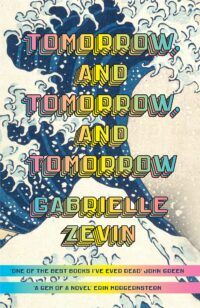
Tomorrow and Tomorrow and Tomorrow by Gabrielle Zevin
It is not a romance novel, and yet there is a love story. Sam and Sadie take their childhood love for video games and develop it into Ichigo — a blockbuster game with overnight success. You may think that is the end of the story, but that is actually a small minor part. The real story is about a relationship that started with video games and evolves into almost everything else. Across the years, we see Sam and Sadie explore the need to connect with those around us. This is about the relationships we make (and break) as we progress through this game called Life.
Cons: Every Gamer is Awesome at Gaming
Confession: I am awful at video games. I have the coordination of a packet of Skittles dropped on a tiled floor: scattered, sometimes cracked, and with no focus or planned escape route (ironically, I also review games). Yet, every gamer I’ve seen in books is somehow gifted with perfect gaming abilities. They know exactly how to jump from platform to platform. They know exactly where the second hidden chest is. They know exactly how to navigate a skill tree. Gamers are seen in books, movies, and TV shows as being naturally gifted, often at a genius level. Watch them crack those knuckles and get to work! Way to feed the ‘imposter syndrome’. Part of the vilification of gaming comes from non-gamers thinking everything has a purpose, and you can’t reach that purpose if you are not good at gaming. It’s a false benchmark and one that constantly perpetuates its own myth by making it all about the game rather than the game experience.
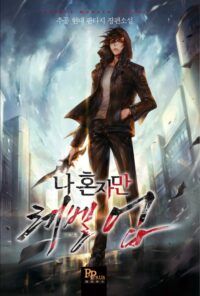
Solo Leveling by Chugong
Jinwoo Sung has no talent (yep, that’s me). That doesn’t stop him from giving it a try. He is part of a group of Hunters, people who enter dungeons to defeat monsters and collect the prize money afterwards. Jinwoo knows he has no skills, but he usually targets his dungeons in a way that keeps him alive. Until he joins a party who finds a hidden double dungeon. Abandoned and left to die, Jinwoo accepts his fate… and then receives a message: [Congratulations on becoming a Player]. What is the cost of constantly driving to ‘level up’?
The past years have shown us how gaming can be a part of any life, not just some idealistic group we label “gamers.” But we still need to work on what we think gamers are. How many of us picked up a Joy-Con and played Animal Crossing: New Horizon during COVID Lockdowns? Yet most would not consider that action to count them as gamers. Why not? Books and games can both serve the same purpose: to open up our world. Do Gamers Read? Of course we do! And we want to see ourselves in the stories too!
If you want to explore games based on books, check out our list of the 12 best here. We also have recs for cozy video games that feel like reading a book. It’s also worth noting, Yong included a list of games to play in her book Two Can Play That Game. A great way to reconnect with one of the best books to portray gamers right.



